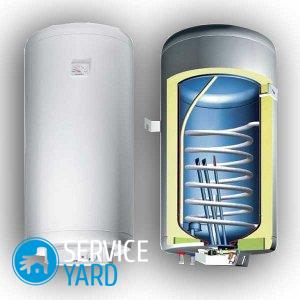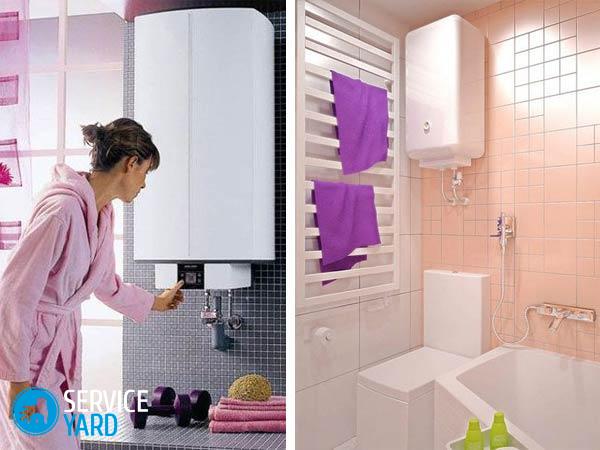Which is better - a gas water heater or a boiler?

In recent years, private houses and apartments have become increasingly equipped with individual sources of hot water. Therefore, such a thing as a centralized supply of hot water began to recede gradually into the background. Many agree with the opinion that it is much more convenient and more profitable to have your own water heater. Thanks to this device, you can independently control the financial costs of utilities and, at your discretion, dispose of free funds. In this article, we will consider a rather popular question today, which worries many who cannot decide which is better - a gas water heater or a boiler. The main thing is to figure out what are the pros and cons of these two versions of equipment for heating water.
to contents ↑What are the different types of equipment for heating water?
Today, two types of high-quality water heaters are distinguished, which differ from each other by the principle of operation: storage and flow-through.
Important! Both options involve the use of two energy carriers simultaneously, that is, electricity and natural gas.
If you collect them into one list, then it will look like this.
- Geysers. They constantly compete with electric water heaters, so consumers are trying to figure out what is best - a column or a boiler. So, geysers are devices that directly heat running water in a heat exchanger through a burner flame. Due to this, we get hot water almost immediately, as soon as we open the tap.
- Accumulative electric water heaters - they are popularly called boilers. They work as follows: the tank is filled with cold water, and then gradually it is heated due to the built-in heating elements. Therefore, it makes no sense to open the faucet with hot water until it warms up to at least 40 degrees, and this requires at least 2 hours. If the water does not collect, but has reached the desired heating temperature, then the device simply maintains it at the desired level, so the heating elements are periodically turned on and off.
- Accumulative gas heaters. These devices appeared on the market quite recently, which is probably why they are not too popular among consumers. They are a cross between an electric boiler and a geyser. That is, the water is heated with gas, and they work on the principle of boilers.
- Flowing electrical installations. By the principle of operation, they are similar to geysers, but only use electricity instead of gas. It is almost impossible to meet such a device in a private house. The fact is that such heaters are too powerful, and not every house is able to withstand such an electrical voltage.
Advantages and disadvantages of geysers
In order to answer with full confidence the question of which is better - a gas or electric water heater, you should consider both options in more detail and familiarize yourself with their positive and negative sides.
Advantages of modern geysers:
- The ability to provide unlimited time to even the largest house with hot water.
- Water heating starts immediately after the valve is opened, and until the valve closes, the burner will work.
- Modern units are equipped with an electronic control system, so the water pressure does not affect the temperature of its heating.
- Compact sizes that allow you to install the appliance even in the smallest kitchen.
- High level of reliability and lack of difficulties in case of repair.

Disadvantages of gas devices:
- Too troublesome column installation process, requiring financial investments. It is necessary not only to draw up a project, but also to coordinate it, and only then install and connect the device. In addition, the device itself must be licensed.
- Mandatory presence of supply and exhaust ventilation and chimney.
- The need to determine the pressure level of gas and water.
- In terms of efficiency, they significantly lose to boilers, because their efficiency is not more than 92%, and for electric heaters as much as 98-99%.
to contents ↑Important! It is also necessary to take into account the fact that in most cities in winter the inlet water temperature is quite low, so even the most powerful gas column cannot heat it to the desired temperature.
Pros and Cons of Electric Water Heaters
We continue to look for the answer to the question of which is better - a water heater or gas water heater, and now the turn of boilers has come. We will find out why most consumers prefer them.
Advantages of electric water heaters:
- Easy to install, not requiring coordination and involvement of representatives of special energy supply organizations.
- Do not need mandatory ventilation and a chimney.
- No dependence on temperature and water pressure in the common network.
- Efficiency up to 99%.
- The ability to provide a large flow of hot water.
- In modern boilers, heating elements do not come into contact with water, due to which they are not covered with scale.
Disadvantages of electric boilers:
- Limited water output.
- The need to wait several hours before heating the next portion of water.
- If the tank capacity is incorrectly selected, then cold water will often run out of it.
to contents ↑Important! The boiler takes up a lot of space, and even the flattest models are considered to be large. After all, even for a family of three people, at least 80 liters of water will be required.
How to choose between a boiler and a geyser?
Before you finally make a decision for yourself and determine which is better - a gas water heater or boiler, you need to consider a lot of nuances:
- Accumulative gas heaters are considered very promising, because the entire volume of water inside the tank is heated twice as fast as in electrical devices. In addition, they are not at all dependent on the pressure of the water; they are capable of delivering a huge amount of hot water.
Important! Naturally, if there is no gas supply in the house or there is a low limit on electricity consumption, then there can be no question of any choice.
- In terms of convenience, gas water heaters definitely win, but their installation flies into a considerable penny.
- In terms of cost and ease of installation, of course, the boiler wins.
Stock footage
The correctness of the final choice directly depends on a huge number of factors. It is unequivocal to say that any device is one hundred percent better than impossible. And if a boiler with a high power reserve is installed in your house, then it is better to give preference to a boiler with indirect heating of water. Such heaters combine a huge number of advantages and practically have no drawbacks.
- How to choose a vacuum cleaner taking into account the characteristics of the house and coatings?
- What to look for when choosing a water delivery
- How to quickly create comfort at home - tips for housewives
- How to choose the perfect TV - useful tips
- What to look for when choosing blinds
- What should be running shoes?
- What useful things can you buy in a hardware store
- Iphone 11 pro max review
- Than iPhone is better than Android smartphones



